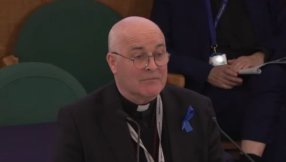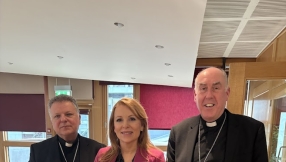
The vote in July's General Synod against an amendment affirming the Alpha and Christianity Explored courses in prisons showed a disturbing level of hostility towards the gospel message that charismatic and conservative evangelicals are proclaiming.
On Saturday July 8, the Synod meeting in York accepted a worthy motion from Mrs Kashmir Garton, a lay member from Worcester, celebrating the contribution of faith to the rehabilitation of offenders. The motion noted "with pleasure the decision by the Probation Service to recognise faith and belief in reducing offending".
Rev Matt Beer, a clergy member from Lichfield, tried to beef up the Christian content in the motion by inserting an amendment rejoicing "at the effectiveness of courses such as Alpha and Christianity Explored in helping prisoners and detainees come to faith in Christ and transform their lives so that they can make a positive contribution to society".
But after two members branded the amendment "partisan" and "sectarian" Synod voted it down in a show of hands by an apparently large majority.
Ruth Abernethy, a lay member from the Channel Islands, said: "My concern with the amendment is that it identifies two particular courses that espouse views of Christianity that are somewhat partisan."
Robert Thompson, a clergy member from London, said the amendment would make the motion "sectarian and coming from a particular part of the Church of England".
"We are not given any data about what 'the success', in inverted commas, rates of what either of these courses may or may not be in relation to prisoner rehabilitation," he said.
He concluded: "We are guests in a secular environment and unless we actually think very carefully about what that means in relation to promoting particular sectarian teaching materials, we are going to be sunk in relation to our presence within our national life."
Millions of people across the world have attended these two courses, both launched by Church of England churches. Alpha, an 11-week evangelistic course run by churches across multiple denominations including Roman Catholics, was launched by Holy Trinity Brompton, the evangelical charismatic flagship church in London's Knightsbridge, in 1977. The course has been translated into 112 different languages, according to the Alpha website.
Christianity Explored, launched in 2001 by conservative evangelical flagship church, All Souls Langham Place in London's Oxford Circus, is also international and cross-denominational.
The courses differ in content reflecting the theological distinctives between charismatic and conservative evangelicals. But both present the penal substitutionary view of the atonement, the idea that Jesus Christ died in the place of sinful humanity on the Cross.
The idea that the righteous justice of God against those who do evil was "satisfied" by the death of Christ is thoroughly Anglican. This view of the atonement is clearly proclaimed in the Anglican Book of Common Prayer (BCP). According to the BCP service of Holy Communion, Christ made on the Cross "a full, perfect and sufficient sacrifice, oblation, and satisfaction for the sins of the whole world".
The biblical fact that God's righteous anger or wrath against evil-doers was satisfied by the death of Christ is stressed by the use of the word "propitiation" in one of the "Comfortable Words", four New Testament quotations in the BCP Communion service: "If any man sin, we have an Advocate with the Father, Jesus Christ the righteous: and he is the propitiation for our sins" (1 John 2v1b-2a).
In this context, propitiation means that Christ averted the righteous wrath of God from sinful humanity through his willing, loving and obedient self-giving on the Cross.
Opponents of this doctrine have labelled it "cosmic child abuse". But that criticism fails to reckon with the divinity as well as the humanity of Jesus Christ. As God the Son, the second Person of the Trinity, Christ was in a vital sense propitiating his own righteous judgement against evil in the world through his death on the Cross.
For Synod members to have swallowed the line that these courses are "partisan" and "sectarian" and so have voted against an amendment affirming their use in prisons sadly reveals woeful ignorance of traditional Anglican theology.
Because evangelicals are evangelistic in their very spiritual DNA, might Anglican evangelicals conclude that now is the time to shake the dust off their feet in relation to the CofE and do their evangelism through a new, orthodox Anglican federation of churches in the UK that rejoices in Alpha and Christianity Explored?
Julian Mann is a former Church of England vicar, now an evangelical journalist based in Lancashire.













